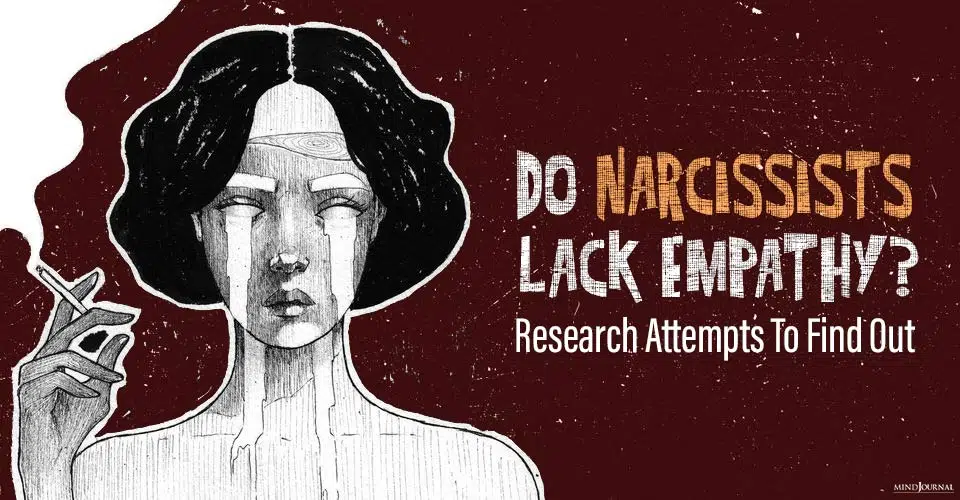When we think about whether narcissists lack empathy or not, the answer might not be always black and white. Research attempts to find out the relationship between narcissists and empathy. So, do narcissists lack empathy, or do all narcissists lack empathy?
We generally assume that narcissistic people lack empathy, and we employ this assumption to account for some of their undesirable behaviors and traits. However, there are circumstances where narcissistic individuals will display empathy, which can be confusing.
Many narcissistic people who seem to lack empathy for other humans in their lives can express enormous compassion for their pets, and they may overtly express empathy for a sad child or an injured animal. Thus, let’s consider the possibility that narcissists are consciously and unconsciously unwilling to empathize, rather than lacking the capacity to do so. If this is so, then how do we make sense of their unwillingness?
A lack of empathy is often considered to be one of the distinctive features of narcissism. However, this is not entirely the case. The criteria for the formal psychiatric diagnosis of narcissistic personality disorder in the Diagnostic and Statistical Manual of Mental Disorders of the American Psychiatric Association includes “lacks empathy,” but this designation has a critical qualifier: namely, “is unwilling to recognize or identify with the feelings and needs of others.” [4]
An unwillingness to empathize with another person is not the same as being unable to empathize. The notion that a person has a capacity for empathy, yet is not empathically responsive, may be useful for understanding the personality characteristics of people we label as narcissistic.
Related: Narcissistic Traits Female: 7 Signs of A Female Narcissist
Empathy is the capacity to think and feel oneself into the inner life of another person. [1] Some regard empathy as a vicarious affective response based on the awareness of another person’s emotional state.
[2] Many definitions of empathy include the concept of perspective-taking—emotionally or cognitively seeing things from the other person’s position.
[3] Thus, empathy can involve both a cognitive process (the ability to understand another person’s view in terms of what the other is thinking or feeling) and an experiential process (resonating with another person’s emotional response).

Some researchers have found that the cognitive functioning necessary for empathy, such as the ability to role-play or take another person’s perspective, occurs in a different location of the brain than the emotional aspects of empathy, such as sensitivity to what another person is feeling or experiencing.
[5] Whether one is narcissistic or not, our brains simulate the feelings of those around us. This ability to unconsciously mimic another’s feelings enables us to reconstruct within us what other people may be experiencing. [6] [7]
Given the many complicated interactions we have with others throughout our lives, the ability to automatically understand what is going on with someone else is a crucial skill for successful social functioning.
Some studies have shown a relationship between narcissism and deficient emotional empathy, but that narcissists, nevertheless, can recognize and react to the suffering of others, even if they are motivated to disregard such distress in other people. [8]
The capacity to empathize does not preclude its use for bad behavior or destructive purposes. [9] [10] Some people may consciously or unconsciously be motivated to withhold an empathic response to control a partner, or they may exploit their understanding of another person’s emotional state to manipulate them or to gain power.
Using their empathy manipulatively, for example, people with narcissistic pathology know how to evoke insecurity in their partners and provoke attachment anxiety. [11]
Related: Narcissists And Empathy: Do Narcissists Have Selective Empathy?
Consider for a moment that narcissistic people do not really lack empathy, but instead, their vulnerability and need for self-protection limits their freedom to express it. Consciously or unconsciously they are unwilling to empathize rather than lack the capacity to do so. In particular situations, someone with a narcissistic personality may feel emotionally safe and capable of vulnerability.
The subjective experience of trust can be a powerful tool for narcissists that reduces perceived threats and allows them to attend to the needs and feelings of others. [12] There is evidence indicating that narcissistic individuals are hyper-sensitive to information that could cause them psychological distress, but at the same time, they may be oblivious to such information at the level of conscious awareness. [13]
Interpersonally, when someone with narcissistic traits experiences helplessness or vulnerability, they are likely to withhold an empathic response automatically, appearing cold-hearted or refusing to take responsibility for hurtful behavior.
How do we understand the personality development of someone who appears to lack empathy or has an unwillingness to empathize? The answer involves a personality organization that is scripted to avoid shame. Our lifetime of emotional responses and the responses of others to our emotional expressions script or automate our behavior in different ways. [14]
When emotions occur in persistent or repeated forms, we consider them as dispositional characteristics of the individual or personality traits—situations that typically activate a coherent pattern of interacting emotions or scripted behaviors. Unfortunately, the language of personality traits overshadows the emotional states that motivate the behavior. [15]
For example, we generally consider narcissism as having to do with behaviors or traits, such as grandiosity, entitlement, and a lack of empathy, but this obscures how these behaviors and traits are patterned responses to specific emotional experiences. Shame is the central emotional experience of narcissism, and narcissistic disorders reflect behaviors that disown or regulate shame. [16] [17]
Since an empathic response often involves an unconscious assessment of one’s vulnerability to experiencing shame, the narcissist’s inhibition of an empathic response (“unwillingness”) may simply be self-protective. This also points to the affective limitations that accompany narcissistic personality disorder.
Narcissists do not consciously feel a lack of empathy or experience an unwillingness to empathize. Instead, in many situations where one might expect them to empathize, their limitations activate a sense of helplessness—an imagined vulnerability— followed by scripted responses to shame, such as shame-fear (fear of loss of face) or shame-rage (protection from some trauma or imagined trauma from the past). [18]
Related: Narcissists Lack Empathy: How Narcissists Fool You With False Empathy
Thus, if you are involved with someone whose behaviors are motivated by shame-avoidance, your task is to protect yourself since they will be consciously or unconsciously unwilling to empathize with you. Commonly, heartbroken people explain their relationship rupture as due to their former partner’s “lack of empathy,” concluding they had been in love with a narcissist.
However, it is possible to respond to our own shame by attacking the other who could not provide what we needed in the first place, given their restricted emotional freedom. Instead, by accepting our disappointment and misdirection, and looking inside ourselves, we can learn because we have the emotional resources and willingness that enable us to do so.
Want to know more about whether narcissists lack empathy or not? Check this video out below!
For information about my books please visit my website: marylamia.com
Written By Mary C. Lamia Ph.D. Originally Published On Psychology Today









Leave a Reply
You must be logged in to post a comment.